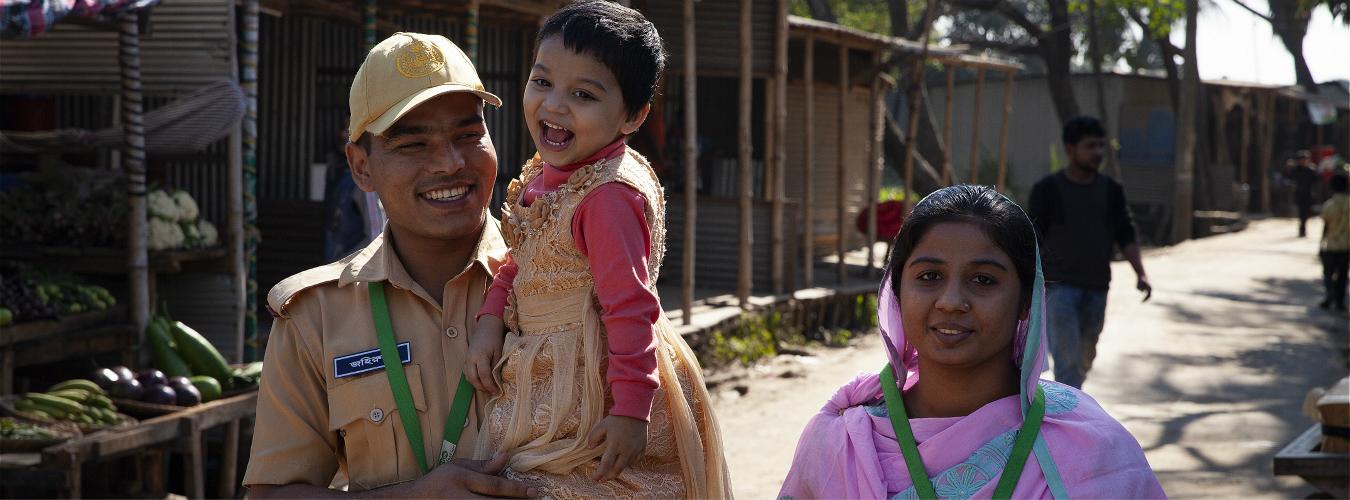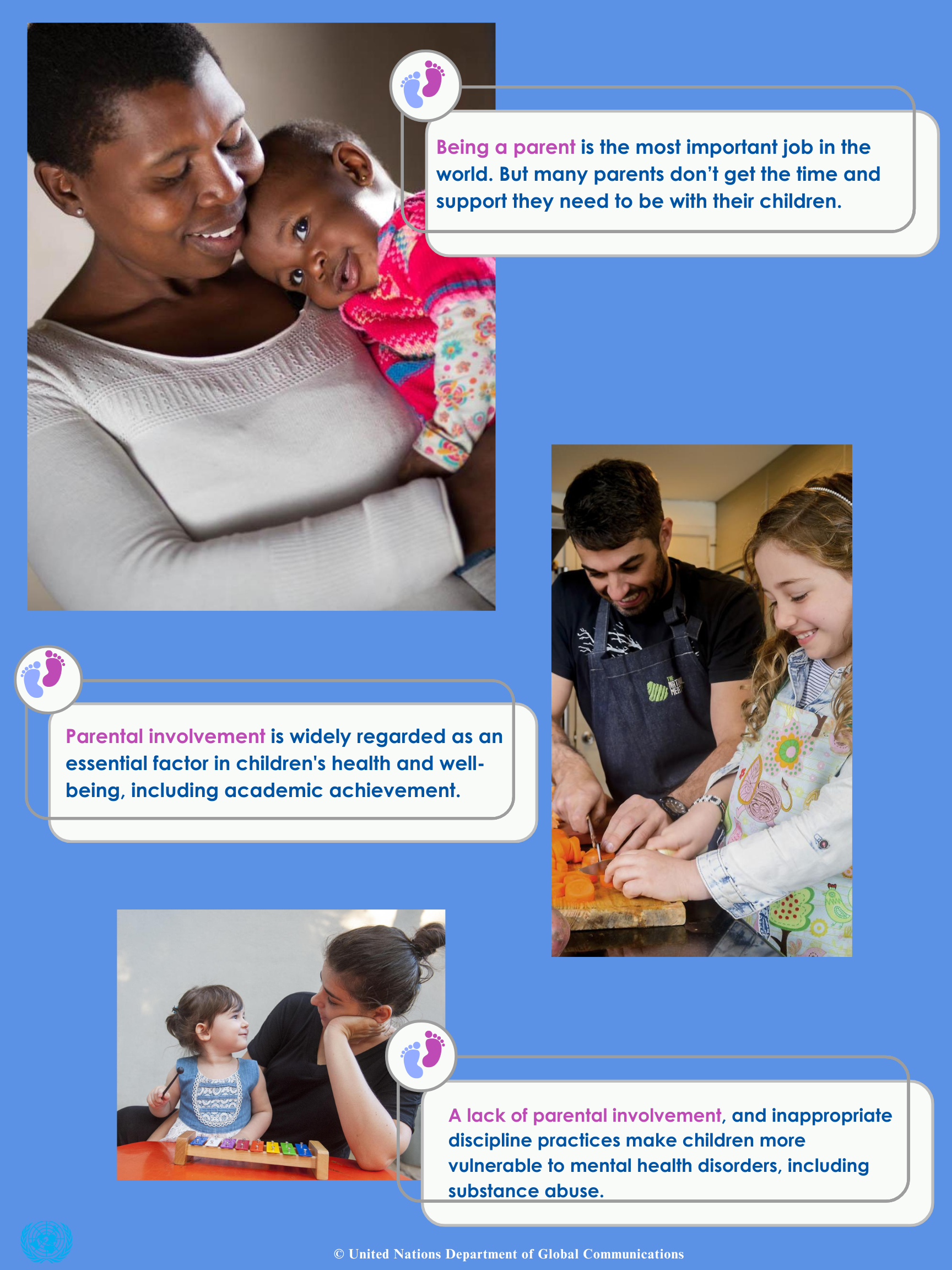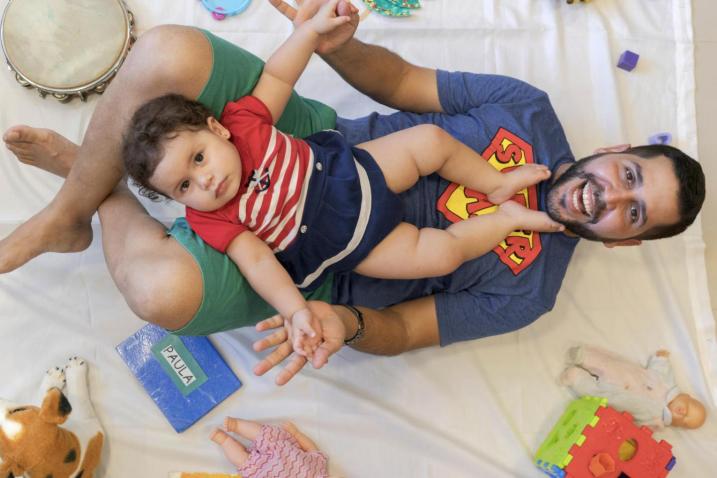Global Day of Parents | United Nations (original) (raw)

Dressed in his firefighter uniform, Mohammad Jahirul Islam, 28, carries his daughter, Jisha, 3, to the daycare center she attends at the garment factory, where he and his wife (right) work in Narayangonj, outside Dhaka, Bangladesh, December 2018.
Photo:© UNICEF/UN0292180/Sokol
Appreciate All Parents Throughout the World
Since the 1980s, the important role of the family has increasingly come to the attention of the international community. The General Assembly adopted a number of resolutions and proclaimed the International Year of the Family and the International Day of Families.
Emphasizing the critical role of parents in the rearing of children, the Global Day of Parents recognizes that the family has the primary responsibility for the nurturing and protection of children. For the full and harmonious development of their personality, children should grow up in a family environment and in an atmosphere of happiness, love and understanding.
Designated by the General Assembly in 2012, Global Day of Parents provides an opportunity to appreciate all parents for their "selfless commitment to children and their lifelong sacrifice towards nurturing this relationship."
Families, parents and caregivers play a central role in child well-being and development. They offer identity, love, care, provision and protection to children and adolescents as well as economic security and stability. In keeping with the spirit of the Convention on the Rights of the Child, family and parenting support is increasingly recognized as an important part of national social policies and social investment packages aimed at reducing poverty, decreasing inequality and promoting positive parental and child well-being.
2024 Theme: The Promise of Playful Parenting
Throughout June, United Nations Children’s Fund (expert advice and support for parents, encompassing a broad range of topics from the scientific foundations of play to engaging activities for the entire family. In recognition of the increasing prevalence of online play, they will also provide parents with comprehensive guides and detailed explanations to ensure their children's online experiences are both safe and positive.
Learn how to boost your baby's brain from a Harvard Professor
Dr. Jack Shonkoff, Professor of Child Health and Development at Harvard University, shares his important play tips to boost your child’s brain. In the first 1,000 days of life, a baby’s brain forms 1,000 new connections every second. Just 15 minutes of play can spark thousands of brain connections.
Background
During the 1980's, the United Nations began focusing attention on the issues related to the family. In 1983, based on the recommendations of the Economic and Social Council, the Commission for Social Development in its resolution on the Role of the family in the development process (1983/23) requested the Secretary-General to enhance awareness among decision makers and the public of the problems and needs of the family, as well as of effective ways of meeting those needs.
In its resolution 44/82 of 9 December 1989, The General Assembly proclaimed 1994 as the International Year of the Family; and in resolution47/237 of 1993, the General Assembly decided that 15 May of every year to be observed as the International Day of Families.
In 2012, the General Assembly proclaimed 1 June as the Global Day of Parents, to be observed annually in honour of parents throughout the world.
Did you know?

Related links
- General Assembly resolution establishing the global Day
- UN Reports and Resolutions on Family
- Workers with Family Responsibilities Convention
- Maternity Protection Convention
- Equal Remuneration Convention
- Maternity Protection Convention (Revised)
- Discrimination (Employment and Occupation) Convention
- Workplace Solutions For Childcare
- Reconciling Work And Family Responsibilities: Practical Ideas from Global Experience
- Declaration on Social Progress and Development
- International Covenant on Economic, Social and Cultural Rights
- Convention on the Rights of the Child
- Universal Declaration of Human Rights
Related Observances
- International Women's Day
- International Day of Play
- International Day of Older Persons
- International Day of Family Remittances
- International Widows' Day
- World Children's Day
- International Day for the Elimination of Violence against Women
- International Migrants Day
Support for parenting
Like no one else, parents and caregivers shape the experiences that build their children’s brains and set them on a path towards healthy development. Parenting is too big a job for parents and caregivers to do alone. They need support to give their children the best possible start in life.
Families and Parents: Key to Achieving the SDGs
Families remain at the centre of social life, ensuring the well-being of their members, educating and socializing children and youth and caring for young and old. In particular, family-oriented policies can contribute to the achievement of Sustainable Development Goals relating to doing away with poverty and hunger; ensuring healthy lives and promoting of well-being for all ages; ensuring educational opportunities throughout the lifespan and achieving gender equality.
Why do we mark International Days?
International days and weeks are occasions to educate the public on issues of concern, to mobilize political will and resources to address global problems, and to celebrate and reinforce achievements of humanity. The existence of international days predates the establishment of the United Nations, but the UN has embraced them as a powerful advocacy tool. We also mark other UN observances.


